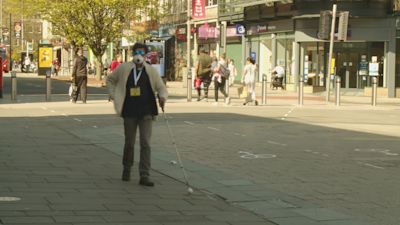Be considerate: The reminder from blind and visually impaired as high streets get busier

Video report by ITV News Meridian's Kara Digby
While the easing of lockdown has been a welcome for many, a man from Hampshire who is blind is among those reminding the public to be more understanding.
Busier high streets and outdoor eating areas are providing more obstacles for the blind and visually impaired.
Suraj Mahajan from Southampton says a whole new set of obstacles have appeared since lockdown began to ease.
He says his concern is an increase in the number of tables and chairs now on the streets, with only outdoor service currently allowed until at least 17 May, when restrictions are due to ease further.
Suraj says: "When chairs of the restaurants, or tables, everything is outside, the boundary of that obstacle becomes very large and we don't know whether we should be going through it, or if we should be going to the left or to the right.
"It kind of worries us at the time if there is some obstacle and it becomes like, we have to just stand there and ask somebody to help. So it becomes a dependancy."
Lockdown easing means more people are heading out to go shopping.
But with social distancing in place and queues outside shops, Zoe Hanscombe who works for the charity Open Sight Hampshire, is appealing for businesses and members of the public to be considerate.
Zoe says: "All guide dogs, including mine, has been designed and trained to find the door to places I want to go into. She's not going to find the queue outside the shop or the place I want to go into, where people are already waiting.
"She's going to take me straight to the door. And then a lot of people think that you've jumped the queue; and that's not the case.
"It's purely that we can't see the queue, with the social distancing lines on the ground and the people waiting. The dog takes us straight to the door because that's what they've been trained to do."
Since the start of the pandemic, Open Sight Hampshire has been providing personalised Support Aid Lanyards to those who are blind and visually impaired, for those who want to get the message to the public that they may need extra support when out and about.
In a survey by the Royal National Institute of Blind People, 66% of people with sight loss said they felt less independent during the pandemic.
The charity has been working with the retail and hospitality industry on how best to take disability into account.
Eleanor Thompson, Head of Policy, says: "It is understandable that people may not have thought about that when they're designing their new measures.
"So we've had quite a positive reaction and we've worked with business networks to share our guidance, we've worked with the government to share our guidance."
"It is things like if you're doing pavement dining, make sure that compared with the restaurant next door, your tables are in line so that it's easy for pedestrians to walk along the pavement. Use high colour contrast furniture if you can so there's some simple adaptations that people can put in place."
UK Hospitality who represent the industry says it's encouraging all establishments to ensure measures are there to support those who are blind and partially sighted.
A spokesperson said: “Hospitality is all about making sure that everyone is made to feel welcome, at ease and able to relax in our venues. That, of course, includes making sure that all possible efforts are made to accommodate blind customers or those with impaired vision.
"When planning new outdoor layouts, operators will consider clear and wide throughways, to help social distancing, to provide good space for the currently mandatory table service, and to ensure that there is minimum infringement into the public realm.
"All of these should help to make the venues more accommodating to guests with visual impairment but it will also be important for venues take into account the challenges of new layouts when training and briefing staff about how to identify and assist any such customers, and how to make their visits safe and comfortable."
Meanwhile the hope is that members of the public will help people like Suraj and Zoe by maintaining space, being patient, and being considerate.
Useful links and information:
Open Sight Hampshire - provides support across Hampshire to those with, or at risk of, sight loss
Royal National Institute of Blind People - a UK charity offering information, support and advice to almost two million people in the UK with sight loss